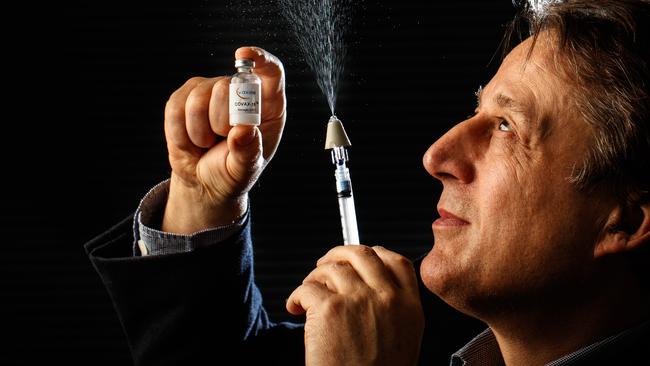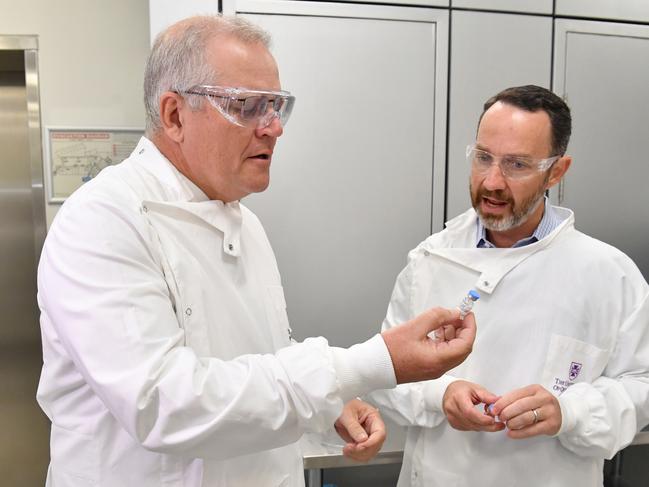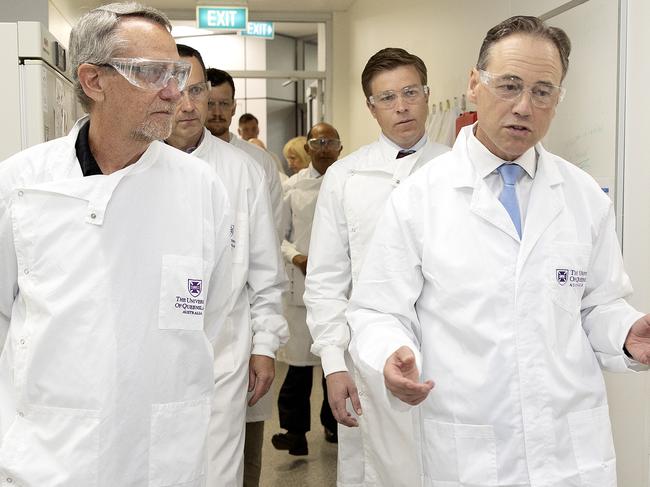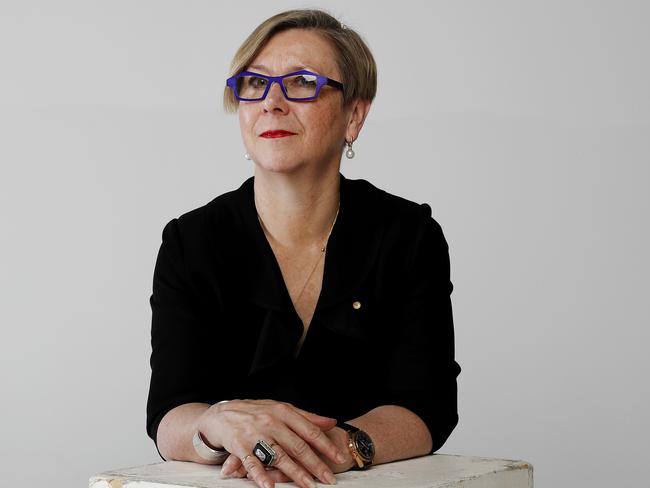Coronavirus: Vaccine scientist Nikolai Petrovsky says HIV warnings were ignored
A leading scientist warned about the use of an HIV fragment protein in University of Qld Covid trials before a deal to buy 51 million doses.

The Federal government was warned by a prominent Australian vaccine scientist that the use of an HIV fragment protein in the University of Queensland COVID-19 vaccine would present “big problems” months before entering into a multimillion-dollar deal to buy 51 million doses of the protein-based candidate.
Adelaide vaccine scientist Nikolai Petrovsky, whose company Vaxine is developing its own COVID-19 vaccine candidate, contacted the Federal health department with concerns after reviewing the published data on the UQ vaccine’s animal studies.
“No one wanted to listen,” Professor Petrovsky said. “There’s a chunk of HIV protein that they’ve used to attach to the vaccine that was always going to be a problem because it induces most of the immune response against the tag. That was clear in their hamster and mouse data.”
The UQ’s protein-based vaccine has been cancelled after volunteers who were injected with the jab during Phase 1 clinical trials returned false positive results to HIV.
The problem with the vaccine stems from the use of the a fragment of a protein known as gp41 in the molecular clamp that UQ scientists used in their vaccine to stabilise the SARS-CoV-2 virus.
“We were concerned by the level of antibodies that they were generating against the clamp which were against HIV,” Dr Petrovsky said. “They didn’t call it that, they just said we’re inducing all of these antibodies against the clamp. But given that the clamp is from HIV obviously that means you’re generating antibodies against HIV.
“It was also clear from their data that the vaccine itself was quite unstable. You could see the profile even after 24 hours was changing on what we call size exclusion, which seemed to indicate that they didn’t have a stable vaccine.
“Overall it just didn’t look like it was going to be a successful vaccine, that’s why we were surprised when the government committed millions of dollars to it, it just seemed disproportionate.”

Professor Petrovsky has long been complaining that UQ received such strong backing from the Federal government while his own vaccine candidate, which is in phase 1 trials, received no support. The Adelaide scientist is of the view that the Federal government has not backed the best vaccine candidates. The Australian government had deals to buy 134 million units of vaccines from four sources. As well as the UQ deal, there are contracts to purchase 10 million doses of the Pfizer-BioNTech vaccine, 40 million from Novavax, and 33.8 million doses of the Oxford-AstraZeneca vaccine.
“We did warn the health department that there was no guarantee the candidates they’d picked would all succeed,” Professor Petrovsky said. “Our view was that they had picked some of the more dubious vaccines.”
UQ abandons plans for Covid vaccine
University of Queensland scientists are abandoning any future efforts to create a COVID-19 vaccine candidate despite phase 1 trials of the failed vaccine continuing.
The scientists say they “do not have the luxury of time” to go back to the drawing board and reformulate their v451 protein-based vaccine.
The Federal government has cancelled its deal with UQ and CSL after participants in phase 1 clinical trials of the vaccine returned positive HIV results.
The problem with the vaccine stems from the use of the fragment protein gp41 which is similar to a protein found in HIV, which was used by UQ scientists in their vaccine to stabilise the SARS-CoV-2 virus. Volunteers injected with the vaccine produced antibodies to HIV which resulted in positive HIV tests.
The UQ scientists confirmed that the protein glycoprotein 41 was used in their molecular clamp.

“The Phase 1 data also showed the generation of antibodies directed towards fragments of a protein gp41, which is a component used to stabilise the vaccine,” UQ said in a statement. “Trial participants were fully informed of the possibility of a partial immune response to this component, but it was unexpected that the levels induced would interfere with certain HIV tests.
“There is no possibility the vaccine causes infection, and routine follow up tests confirmed there is no HIV virus present.”
UQ said “significant changes” would need to be made to well-established HIV testing procedures in the healthcare setting to accommodate rollout of its vaccine.”
“Therefore, CSL and the Australian government have agreed vaccine development will not proceed to Phase 2/3 trials,” the university said.
UQ vaccine co-lead, Professor Paul Young, said that although it was possible to re-engineer the vaccine, the team “did not have the luxury of time” needed. “Doing so would set back development by another 12 or so months, and while this is a tough decision to take, the urgent need for a vaccine has to be everyone’s priority.
“I said at the start of vaccine development that there were no guarantees, but what is really encouraging is that the core technology approach we used has passed the major clinical test. It is a safe and well-tolerated vaccine, producing the strong virus-neutralising effect that we were hoping to see.”
Dr Andrew Nash, Chief Scientific Officer for CSL said “This outcome highlights the risk of failure associated with early vaccine development, and the rigorous assessment involved in making decisions as to what discoveries advance.”
Vaccine decision ‘sensible’
The international alliance that committed millions to funding the University of Queensland’s vaccine says it supports the Federal government’s decision to cancel the protein-based candidate but will continue to support the team behind the failed vaccine.
Jane Halton, the chair of the Coalition of Epidemic Preparedness which had partnered with UQ and CSL to develop the vaccine, said the decision to cancel the vaccine was sensible.
“The decision underscores the importance, which we fully support, of taking vaccine hesitancy very seriously,” Ms Halton said. “We cannot do anything that undermines the support of vaccination programs in respect of this pandemic.”

The UQ’s protein-based vaccine has been cancelled after volunteers who were injected with the jab during Phase 1 clinical trials returned false positive results to HIV.
The problem with the vaccine stems from the use of the HIV protein in the molecular clamp that UQ scientists used in their vaccine to stabilise the SARS-CoV-2 virus. Volunteers injected with the vaccine produced antibodies to HIV which resulted in positive HIV tests.
Ms Halton said the technology behind the UQ vaccine was still promising, and it was possible the UQ scientists could go back to the drawing board to work on a new vaccine candidate.
“CEPI will continue to support UQ researchers,” Ms Halton said. “We believe the molecular technology actually has great potential.
“It’s important to remember that with this candidate, there weren’t safety issues and it did show greater immunogenicity.
“This is an issue with this formulation which has proven a problem but in terms of the work of the researchers, we are fully supportive of them and will continue to support them.”
Ms Halton said there was always a significant risk that the UQ vaccine would fail between the phase 1 and phase 2 study periods. UQ’s vaccine was in Phase 1 safety trials.
“Developing vaccines is a difficult process and many candidates fail,” she said. “It doesn’t necessarily mean that people should lose confidence, because on the contrary, there are still 48 vaccine candidates in human trials around the world.”








To join the conversation, please log in. Don't have an account? Register
Join the conversation, you are commenting as Logout